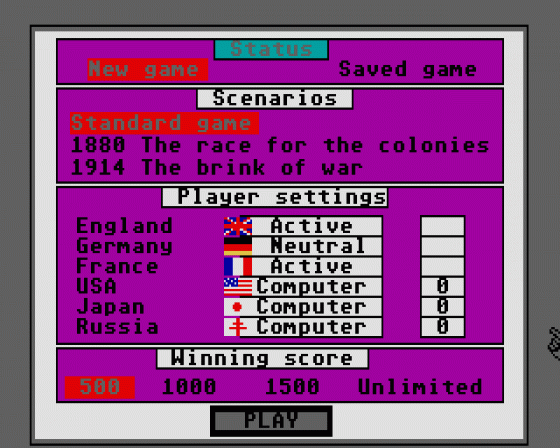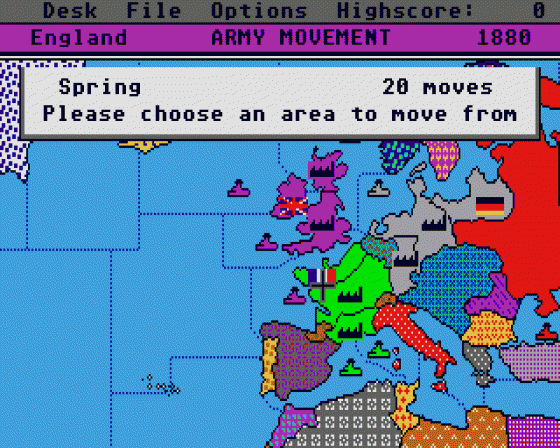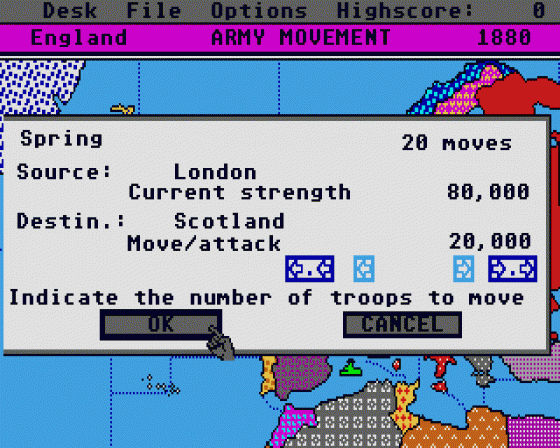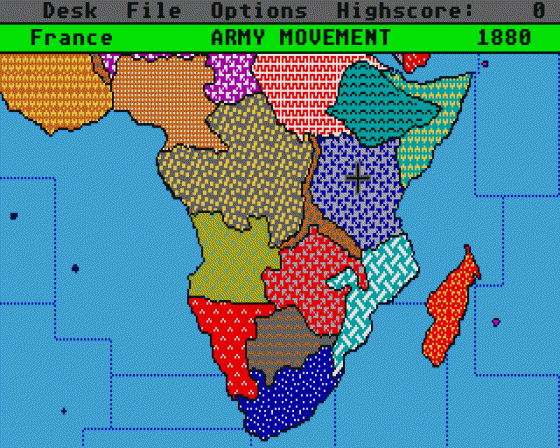
C&VG
 1st October 1987
1st October 1987
Categories: Review: Software
Publisher: Strategic Simulations Inc
Machine: Atari ST
Published in Computer & Video Games #72
Colonial Conquest
The late 1880s and early 1900s marked the grand age of imperialism. Great Britain, the U.S., Germany, France, Russia and Japan were all involved in the pursuit of world dominance.
Now you can relive that era and leave your own mark on history, as the head of any of these great powers, in a bid to colonise as much of the free world as possible, while fattening the domestic coffers, and defending your shores against attack from other major powers - all as greedy as you!
There are three scenarios: standard, 1880 and 1914. If you choose the standard scenario, all the major countries control only their own areas at the start of the game, and the army strength and net worth of all minor countries are randomly set.

With the other two scenarios, each country starts with the additional areas that they actually controlled at the time, and the army strength and net worth of minor countries are present to reflect actual historical fact.
In addition, if the computer controls Russia, France or England, that country is deemed to be at war with Germany, and vice versa.
Up to six humans can play Colonial Conquest, but if you can't get hold of five other power-crazed individuals, the computer can always be relied upon to act as a stand-in imperialist!

Having chosen which of the three scenarios you wish to play, and which country you want to represent, the game commences in earnest.
Colonial Conquest consists of three phases: building, movement and combat. During the building phase, each player in turn can build up his land and naval forces, as well as fortify army installations. You can also offer economic aid to neutral countries in the form of a loan which they will use to build larger armies. You can even lend money to a computer-controlled major power in at attempt to curtail its intentions of attacking you.
If you intend attacking a minor country with more than just brute strength and ignorance, there are two more ways to ensure your victory.

Firstly, you can send spies into that country to ascertain the strength of its armies and the value of its treasury.
Secondly, you can try to undermine that country's military strength by causing a coup d'etat. If you spend enough money, a coup will occur and you will be in control of the country without having to lift a single military finger.
The second phase, movement, is used to move armies to adjacent countries. If the destination country is neutral, or controlled by another major power, this is seen as an act of war and battle ensues.

The game rules apply to naval incursions, except that a ship can sail to any other port on the map. Each ship can only carry 1000 soldiers and all are lost when you suffer a defeat at sea, so it's important to co-ordinate the movements of your navy in the most efficient manner possible.
The final phase, combat, is where players see the results of the decisions they made in the previous two phases.
In this computer-controlled sequence, the game scrolls over the 4x2 screen map of the world, showing the result of each individual battle by the colour in which disputed territory is filled.

No change of colour means the defending power managed to hang on to control of that country.
As each player inputs his or her instructions for each of the game phases, the other players must look away from the screen. This is a perfect time for the other players to indulge in a little diplomatic banter or back-stabbing. The ability for players to make and break peace treaties and agreements, and to gang up on one another, makes the game similar in some respects to the excellent board game Diplomacy.
As you delve deeper into Colonial Conquest, you realise just how much thought went into the design of this computerised board game.
The ST conversion (another by Hungary's Andromeda Software) is proficient and bug-free, and should appeal to anybody who likes Risk, Diplomacy, or a spot of armchair dictating.






